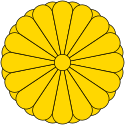From Wikipedia, the free encyclopedia
1983 Japanese House of Councillors election
First party
Second party
Third party
Leader
Yasuhiro Nakasone
Masashi Ishibashi
Yoshikatsu Takeiri
Party
LDP
Socialist
Kōmeitō
Last election
135 seats, 42.5%
47 seats, 13.1%
26 seats, 11.9%
Seats after
137
44
26
Seat change
Popular vote
16,441,437
7,590,331
7,314,465
Percentage
35.3%
16.3%
15.7%
Swing
Fourth party
Fifth party
Sixth party
Leader
Kenji Miyamoto
Sasaki Ryōsaku
Seiichi Tagawa
Party
JCP
Democratic Socialist
New Liberal Club
Last election
12 seats, 7.3%
11 seats, 6.0%
2 seats, 0.6%
Seats after
14
11
2
Seat change
Popular vote
4,163,877
3,888,429
1,239,169
Percentage
8.9%
8.4%
2.7%
Swing
House of Councillors elections were held in Japan on 26 June 1983. The result was a victory for the ruling Liberal Democratic Party , which won 68 of the 126 seats up for election, retaining its majority in the House.
Party National Constituency Seats Votes % Seats Votes % Seats Not up Won Total +/– Liberal Democratic Party 16,441,437 35.33 19 19,975,034 43.24 49 69 68 137 +2 Japan Socialist Party 7,590,331 16.31 9 11,217,515 24.28 13 22 22 44 –3 Kōmeitō 7,314,465 15.72 8 3,615,995 7.83 6 12 14 26 0 Japanese Communist Party 4,163,877 8.95 5 4,859,334 10.52 2 7 7 14 +2 Democratic Socialist Party 3,888,429 8.36 4 2,638,780 5.71 2 5 6 11 0 New Party for Salaried Men 1,999,244 4.30 2 0 2 2 New Japan Wellbeing Party 1,577,630 3.39 1 0 1 1 New New Liberal Club 1,239,169 2.66 1 563,811 1.22 1 0 2 2 0 Dainiin Club 1,142,349 2.45 1 1 1 2 New Other parties 1,179,997 2.54 0 1,561,835 3.38 2 2 2 4 – Independents 1,768,021 3.83 1 5 1 6 –7 Vacant 3 0 3 3 – Total 46,536,928 100.00 50 46,200,325 100.00 79 123 129 252 0 Valid votes 46,536,928 97.57 46,200,325 96.86 Invalid/blank votes 1,159,404 2.43 1,500,034 3.14 Total votes 47,696,332 100.00 47,700,359 100.00 Registered voters/turnout 83,682,416 57.00 83,682,416 57.00 Source: Ministry of Internal Affairs and Communications ,[ 1] [ 2] National Diet
About Japan Series (1999), Changing Japanese Politics , No. 24, Tokyo: Foreign Press Center.
Mahendra Prakash (2004), Coalition Experience in Japanese Politics: 1993-2003 , New Delhi : JNU [1] .







